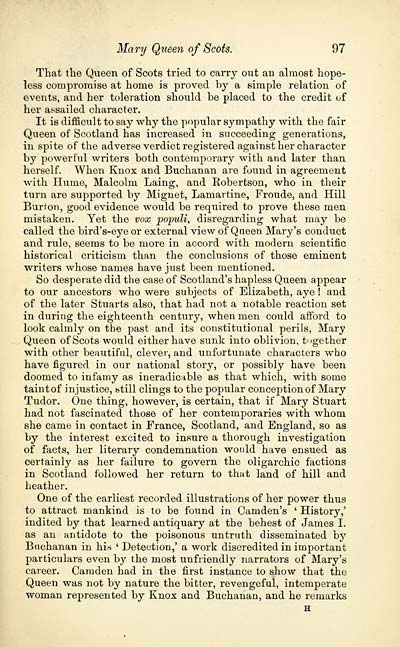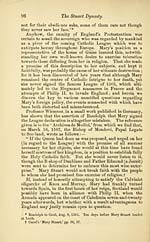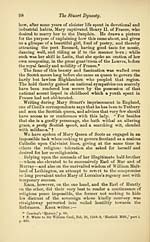Stuart dynasty
(117) Page 97
Download files
Complete book:
Individual page:
Thumbnail gallery: Grid view | List view

Mary Queen of Scots. 97
That the Queen of Scots tried to carry out an almost hope-
less compromise at home is proved by a simple relation of
events, and her toleration should be placed to the credit of
her assailed character.
It is difficult to say why the popular sympathy with the fair
Queen of Scotland has increased in succeeding generations,
in spite of the adverse verdict registered against her character
by powerful writers both contemporary with and later than
herself. When Knox and Buchanan are found in agreement
with Hume, Malcolm Laing, and Robertson, who in their
turn are supported by Mignet, Lamartine, Froude, and Hill
Burton, good evidence would be required to prove these men
mistaken. Yet the vox populi, disregarding what may be
called the bird's-eye or external view of Queen Mary's conduct
and rule, seems to be more in accord with modern scientific
historical criticism than the conclusions of those eminent
writers whose names have just been mentioned.
So desperate did the case of Scotland's hapless Queen appear
to our ancestors who were subjects of Elizabeth, aye ! and
of the later Stuarts also, that had not a notable reaction set
in during the eighteenth century, when men could afford to
look calmly on the past and its constitutional perils, Mary
Queen of Scots would either have sunk into oblivion, together
with other beautiful, clever, and unfortunate characters who
have figured in our national story, or possibly have been
doomed to infamy as ineradicable as that which, with some
taintof injustice, still clings to the popular conception of Mary
Tudor. One thing, however, is certain, that if Mary Stuart
had not fascinated those of her contemporaries with whom
she came in contact in France, Scotland, and England, so as
by the interest excited to insure a thorough investigation
of facts, her literary condemnation would have ensued as
certainly as her failure to govern the oligarchic factions
in Scotland followed her return to that land of hill and
heather.
One of the earliest recorded illustrations of her power thus
to attract mankind is to be found in Camden's ' History,'
indited by that learned antiquary at the behest of James I.
as an antidote to the poisonous untruth disseminated by
Buchanan in hi.s ' Detection,' a work discredited in important
particulars even by the most unfriendly narrators of Mary's
career. Camden had in the first instance to show that the
Queen was not by nature the bitter, revengeful, intemperate
woman represented by Knox and Buchanan, and he remarks
H
That the Queen of Scots tried to carry out an almost hope-
less compromise at home is proved by a simple relation of
events, and her toleration should be placed to the credit of
her assailed character.
It is difficult to say why the popular sympathy with the fair
Queen of Scotland has increased in succeeding generations,
in spite of the adverse verdict registered against her character
by powerful writers both contemporary with and later than
herself. When Knox and Buchanan are found in agreement
with Hume, Malcolm Laing, and Robertson, who in their
turn are supported by Mignet, Lamartine, Froude, and Hill
Burton, good evidence would be required to prove these men
mistaken. Yet the vox populi, disregarding what may be
called the bird's-eye or external view of Queen Mary's conduct
and rule, seems to be more in accord with modern scientific
historical criticism than the conclusions of those eminent
writers whose names have just been mentioned.
So desperate did the case of Scotland's hapless Queen appear
to our ancestors who were subjects of Elizabeth, aye ! and
of the later Stuarts also, that had not a notable reaction set
in during the eighteenth century, when men could afford to
look calmly on the past and its constitutional perils, Mary
Queen of Scots would either have sunk into oblivion, together
with other beautiful, clever, and unfortunate characters who
have figured in our national story, or possibly have been
doomed to infamy as ineradicable as that which, with some
taintof injustice, still clings to the popular conception of Mary
Tudor. One thing, however, is certain, that if Mary Stuart
had not fascinated those of her contemporaries with whom
she came in contact in France, Scotland, and England, so as
by the interest excited to insure a thorough investigation
of facts, her literary condemnation would have ensued as
certainly as her failure to govern the oligarchic factions
in Scotland followed her return to that land of hill and
heather.
One of the earliest recorded illustrations of her power thus
to attract mankind is to be found in Camden's ' History,'
indited by that learned antiquary at the behest of James I.
as an antidote to the poisonous untruth disseminated by
Buchanan in hi.s ' Detection,' a work discredited in important
particulars even by the most unfriendly narrators of Mary's
career. Camden had in the first instance to show that the
Queen was not by nature the bitter, revengeful, intemperate
woman represented by Knox and Buchanan, and he remarks
H
Set display mode to:
![]() Universal Viewer |
Universal Viewer | ![]() Mirador |
Large image | Transcription
Mirador |
Large image | Transcription
Images and transcriptions on this page, including medium image downloads, may be used under the Creative Commons Attribution 4.0 International Licence unless otherwise stated. ![]()
| Histories of Scottish families > Stuart dynasty > (117) Page 97 |
|---|
| Permanent URL | https://digital.nls.uk/94819170 |
|---|
| Description | A selection of almost 400 printed items relating to the history of Scottish families, mostly dating from the 19th and early 20th centuries. Includes memoirs, genealogies and clan histories, with a few produced by emigrant families. The earliest family history goes back to AD 916. |
|---|

